1. Bhagavad Geeta Chapter 2 – Shloka 47
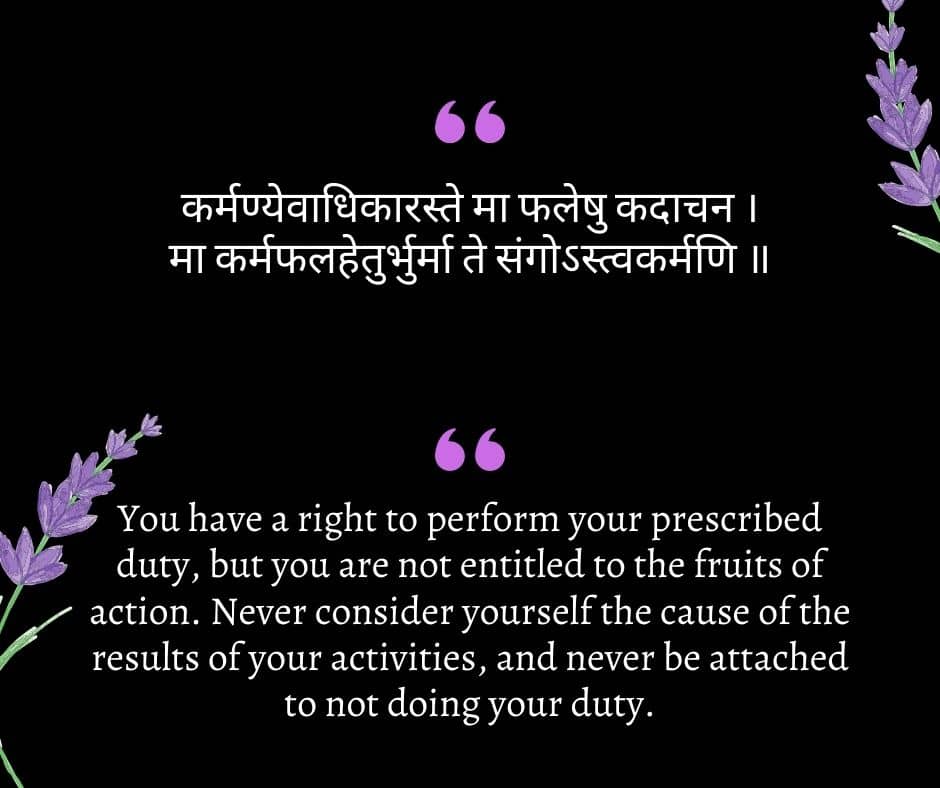
कर्मण्येवाधिकारस्ते मा फलेषु कदाचन ।
मा कर्मफलहेतुर्भुर्मा ते संगोऽस्त्वकर्मणि ॥
Transliteration
karmany evadhikaras te ma phalesu kadacana
ma karma-phala-hetur bhur ma te sango ‘stv akarmani
Literal Translation:
You have a right to perform your prescribed duty, but you are not entitled to the fruits of action. Never consider yourself the cause of the results of your activities, and never be attached to not doing your duty.
Deeper Meaning:
What this shloka essentially says is that the one who perform any action should do it without being attached to the result. One who is attached to the result of his work, is also the cause of the action itself. This results in him being the enjoyer or sufferer of the consequence of his action.
2. Bhagvad Geeta Chapter 2 – Shloka 49
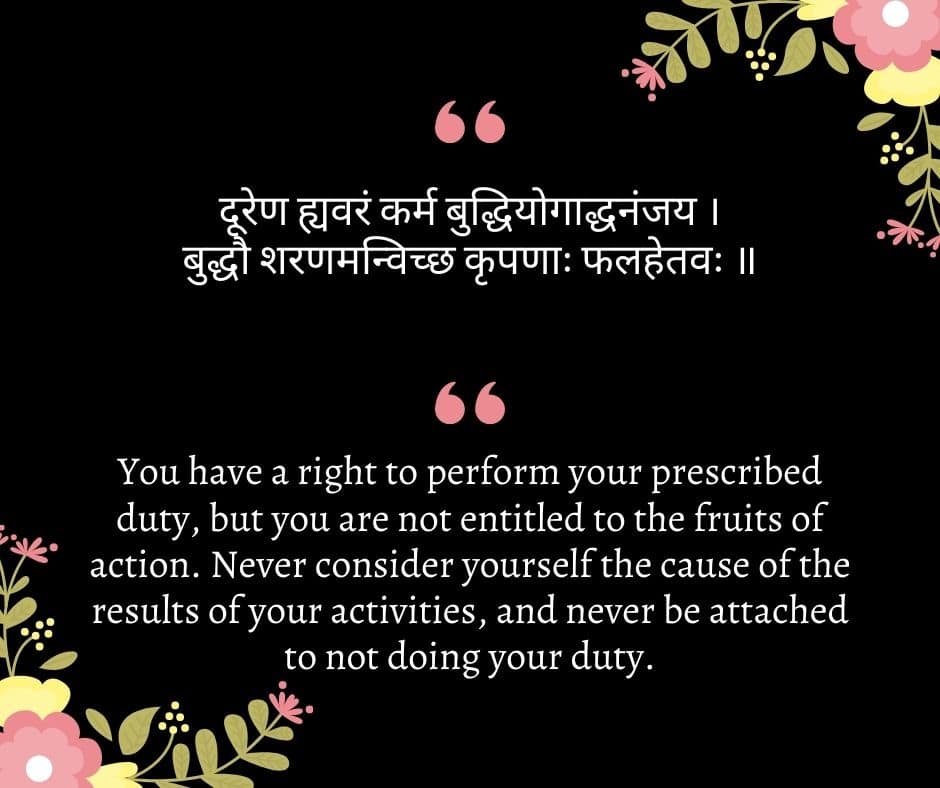
दूरेण ह्यवरं कर्म बुद्धियोगाद्धनंजय ।
बुद्धौ शरणमन्विच्छ कृपणाः फलहेतवः ॥
Transliteration:
na karmanam anarambhan naiskarmyam puruso ‘snute
na ca sannyasanad eva siddhim samadhigacchati
Literal Translation:
O Dhananjaya, keep all the abominable activities far distant by devotional service, and in that consciousness surrender to the lord. Those who want to enjoy the fruits of their work are misers.
Deeper Meaning:
Shri Krishna tell arjuna (also known as Dhananjaya), that those who use their intelligence and work to achieve material possesions are miserly (Kripanah). He advises arjuna to use his work for a superior cause and dedicate it to devotion of the supreme god. The one who surrenders himself and his work to the divine, rids himself from attachment to the material world and stops seeking the fruits of his work.
3. Bhagvad Geeta Chapter 3 Shloka 4
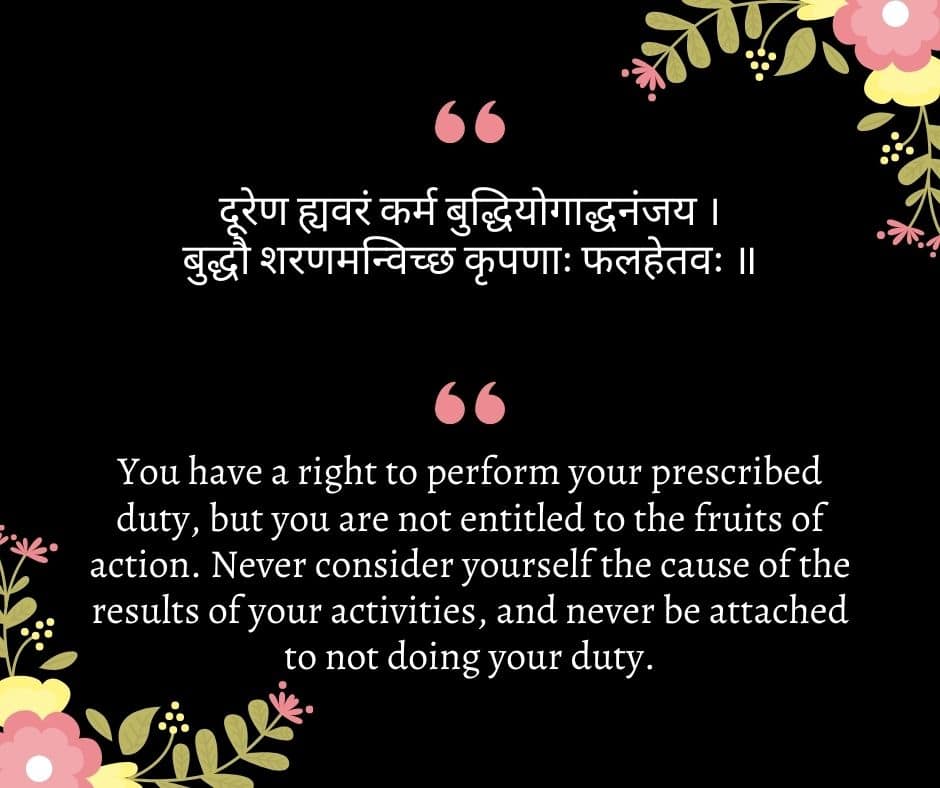
न कर्मणामनारंभान्नैष्कर्म्यं पुरुषोऽश्नुते ।
न च सन्न्यसनादेव सिद्धिं समधिगच्छति ॥
Transliteration:
na karmanam anarambhan naiskarmyam puruso ‘snute
na ca sannyasanad eva siddhim samadhigacchati
Literal Translation:
Neither by abstention action (alone), action-less state man attains, nor by renunciation alone perfection he approaches.
Deeper Meaning:
Lord Krishna, says to Arjuna, that a person who thinks that just by renouncing karma and abstaining from it, he will achieve moksha is wrong. True freedom from the bonds of karma can only be achieved by performing it. This means to involve yourself in appropriate karma which is doing what is needed fully and solely. Nothing in this world can be achieved without karma, and abstaining from it achieves nothing.
4. Bhagvad Geeta Chapter 3 Shloka 6 and 7
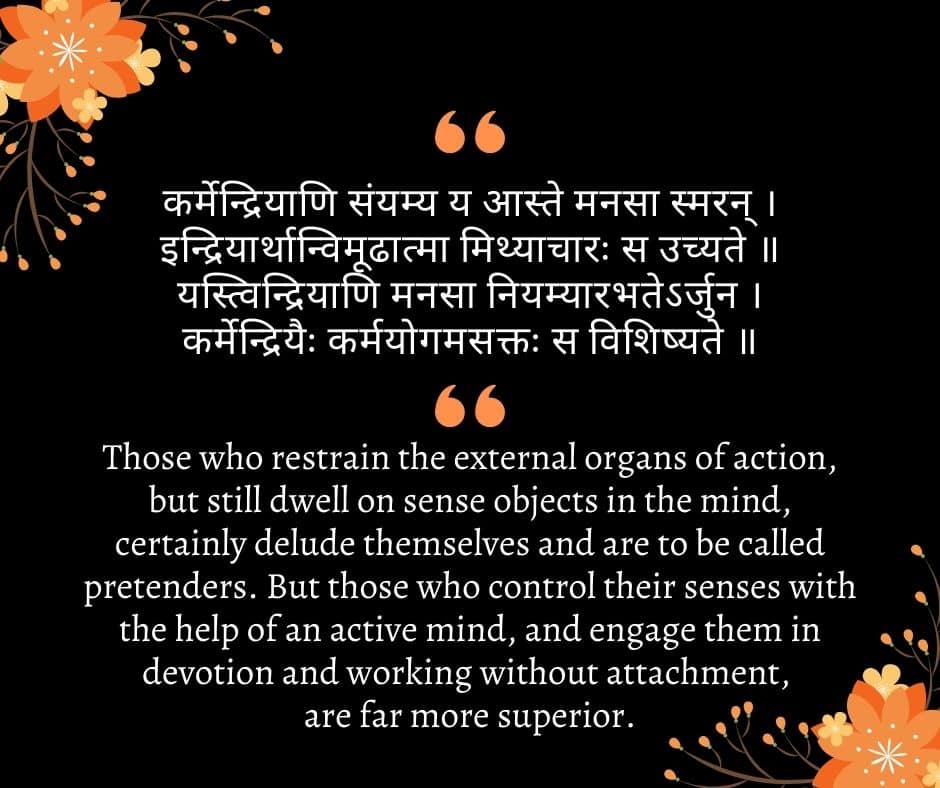
कर्मेन्द्रियाणि संयम्य य आस्ते मनसा स्मरन् ।
इन्द्रियार्थान्विमूढात्मा मिथ्याचारः स उच्यते ॥
यस्त्विन्द्रियाणि मनसा नियम्यारभतेऽर्जुन ।
कर्मेन्द्रियैः कर्मयोगमसक्तः स विशिष्यते ॥
Transliteration:
karmendriyani samyamya ya aste manasa smaran
indriyarthan vimudhatma mithyacarah sa ucyate
yas tv indriyani manasa niyamyarabhate ‘rjuna
karmendriyaih karma-yogam asaktah sa visisyate
Translation:
Those who restrain the external organs of action, but still dwell on sense objects in the mind, certainly delude themselves and are to be called pretenders. But those who control their senses with the help of an active mind, and engage them in devotion and working without attachment, are far more superior.
Deeper Meaning:
In this shloka, Bhagvan shri Krishna explains to Arjuna, the true meaning of karma Yoga. It is a general belief that renouncing the world and taking Sanyasa leads to one attaining enlightenment. That is not the case.
In this shloka, shri Krishna explains that there are two kinds of people. One who works only to bear the fruit of his works. He restrains himself from work but still keeps himself attached to the fruits of his action. He is deluded into thinking that this way he will be free from the cycle of Karma, but in reality, he is deeply bound to the material world.
On the other hand, a true karma yogi, is one who uses his action for the betterment of everyone and everything around him and devotes the fruit of his action to the divine. He has no attachment to result of his work but he is fully devoted to performing his duty towards everyone including his home, society and nature. A karma yogi, in a true sense takes sanyasa and frees himself from the bondage of karma.
5. Bhagvad Geeta Chapter 3, Shloka 8
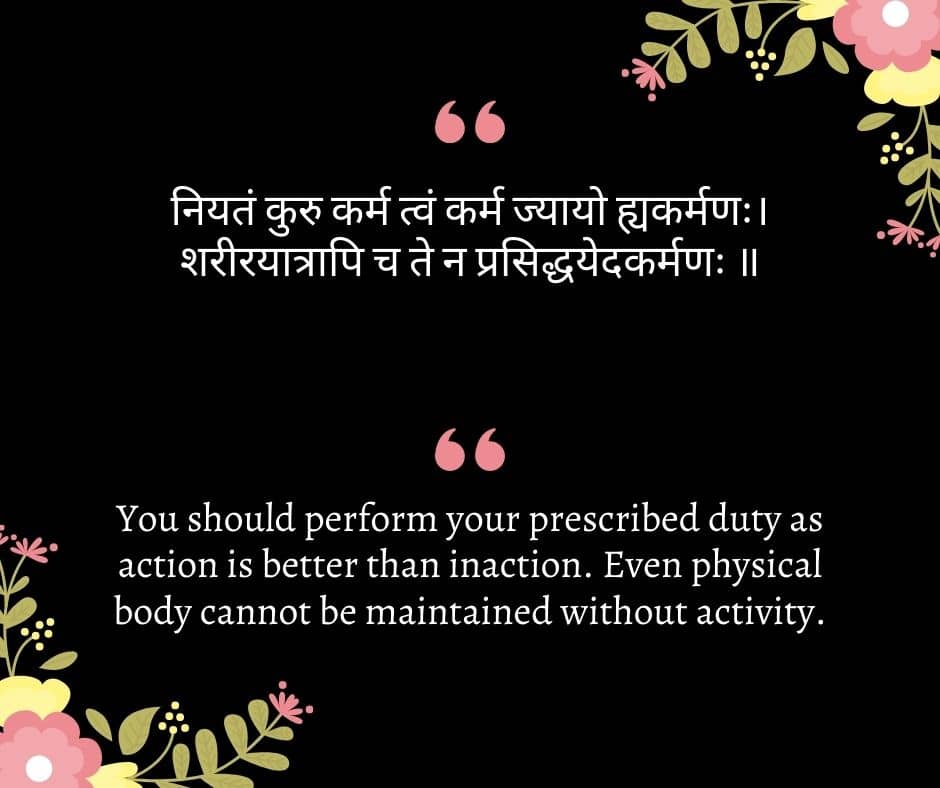
नियतं कुरु कर्म त्वं कर्म ज्यायो ह्यकर्मणः।
शरीरयात्रापि च ते न प्रसिद्धयेदकर्मणः ॥
Transliteration:
niyatam kuru karma tvam karma jyayo hy akarmanah
sarira-yatrapi ca te na prasiddhyed akarmanah
Translation:
You should perform your prescribed duty as action is better than inaction. Even physical body cannot be maintained without activity.
Deeper Meaning:
Nothing can be achieved without action. Even for basic sustenance of the body (health) one has to do something, therefore action is not optional. If action is to be performed, work towards performing your duty. Performing ones prescribed duties purifies the mind and the heart and helps move ahead on spiritual path.
6. Bhagvad Geeta Chapter 3, Shloka 27
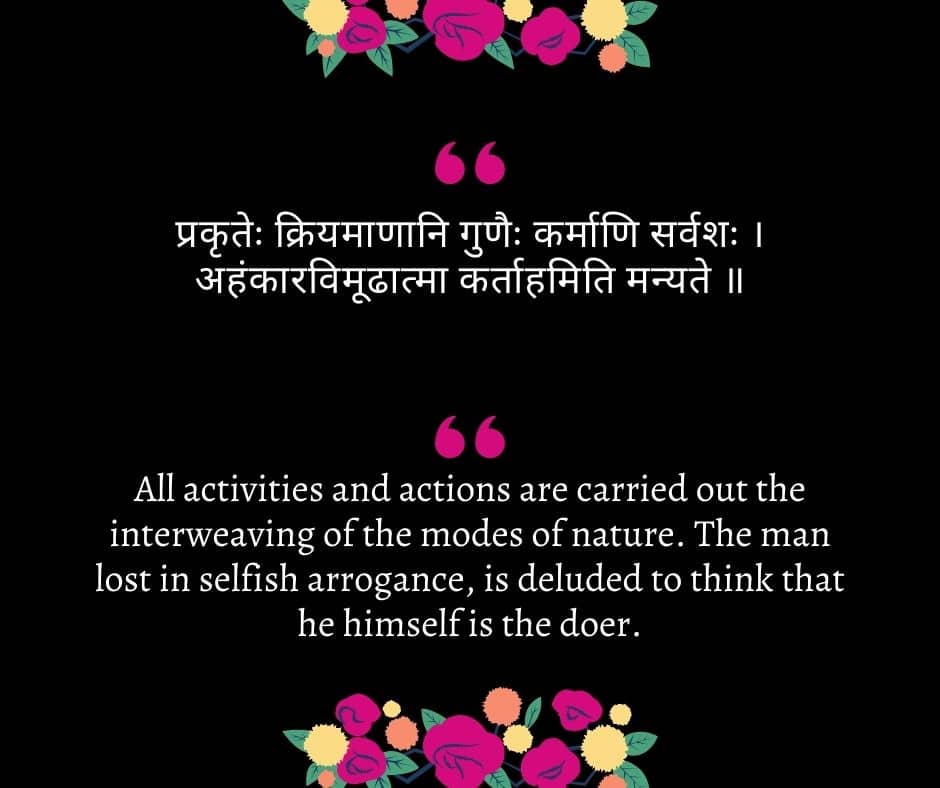
प्रकृतेः क्रियमाणानि गुणैः कर्माणि सर्वशः ।
अहंकारविमूढात्मा कर्ताहमिति मन्यते ॥
Transliteration
prakrteh kriyamanani gunaih karmani sarvasah
ahankara-vimudhatma kartaham iti manyate
Translation
All activities and actions are carried out the interweaving of the modes of nature. The man lost in selfish arrogance, is deluded to think that he himself is the doer.
Deeper Meaning:
All activities that we perform, takes place when the mother nature acts within us as life. The physical body is governed by chemical and biological phenomenon, which are controlled by the trigunas or three gunas satva, rajas and tamas. The one who is too identified with the body thinks himself to be the one performing all the action. He is deluded into thinking that he himself is the body and the mind itself but in reality he is just a soul currently attached to this body performing action.
 Did you find this post useful? Would you like to get back to it later? Save THIS PIN below to your Pinterest Yoga board!


Love this collection of Sanskrit quotes on karma! The Bhagavad Gita is such a powerful text, and these quotes really highlight the importance of intention and action in terms of our spiritual growth. #SanskritQuotes #Karma #BhagavadGita